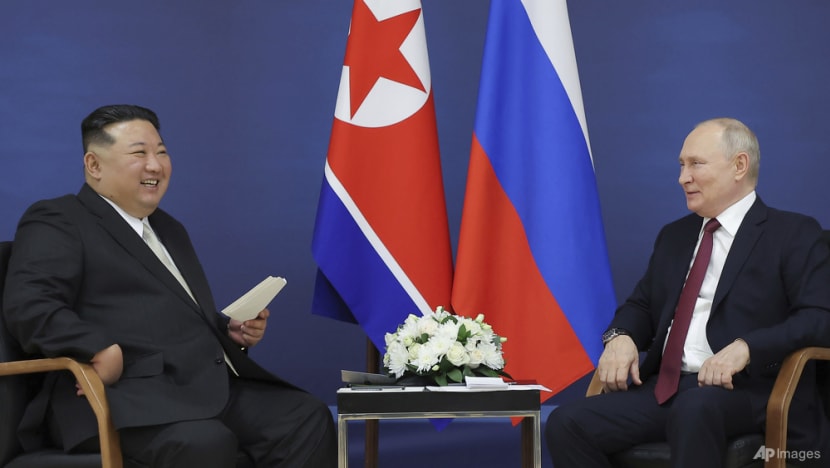Commentary: North Korea’s newfound confidence is a dangerous thing
North Korean is seeking to exploit a fractured geopolitical landscape, increasing the nuclear threat in the process, says Karishma Vaswani for Bloomberg Opinion.

SINGAPORE: The split in the global community over Ukraine and China has been a gift to North Korea. It is increasingly clear that Pyongyang has been emboldened by the formation of a new anti-United States bloc, prompting it to reach out to Beijing and Moscow.
The reignited closeness between North Korea and Russia this week - as evidenced by the luxury armored train carrying Kim Jong Un to a meeting with Vladimir Putin - is a natural partnership. It’s being called a summit of the “anti-West”, a hangover from the Cold War.
There is an important difference: Beijing is in the background but is a much bigger player in this reshaped geopolitical triangle. Sharing handshakes and denouncing “imperialism”, the two leaders of these isolated states drew each further into the other’s orbit.
The face-to-face meeting may have ended with few details of what was discussed, but it is just the start of their renewed cooperation. And it is a common enemy that has drawn them closer.
UNITED STATES IS DISTRACTED
Washington’s aggressive alliance building in the Asia-Pacific, which resulted in the trilateral US-Japan-South Korea Summit in August, has been seen by North Korea as an unwelcome sign of even more American military might in its backyard.
For Russia, this is an opportunity to reach out to a disgruntled partner that it recognises could do with a little help in the form of food and energy supplies to evade sanctions that have crippled its economy, especially since the pandemic.
The US needs to point much more loudly at what this bond means for the rest of us. Reprimands from the White House are disingenuous. It has already signalled these closer ties are unwelcome, and has talked about the repercussions and heavy price Pyongyang will pay if it continues.
But no one is listening, and the US is distracted. Chief among its preoccupations is countering Beijing, what policymakers see as the US’s single most important existential dilemma.
IGNORING NORTH KOREA THREAT IS FOOLISH
Yet ignoring the Pyongyang threat is foolish. Denuclearisation negotiations have stalled and sanctions aren’t working.
Despite being among the poorest countries in the world, North Korea still spends nearly 20 per cent to 30 per cent of gross domestic product on its military. It is also developing weapons at an unprecedented rate, with some estimates saying it now has over 100 nuclear warheads, and has the ability to launch an attack on South Korea and on US forces based there.
The threat of a nuclear-armed North Korea is now a reality and not something that the Biden administration can stall away by defaulting to more sanctions.
Kim was joined by two guests at a recent military parade in Pyongyang, Russia’s Defence Minister Sergei Shoigu, and Li Hongzhong, a member of the Communist Party of China’s 24-member Politburo. This new love triangle is what he is betting on “to end its isolation with strengthened partnerships that will enable a bigger breakout,” as Jonathan Corrado, director of policy for the New York-based Korea Society writes.
That’s not a hidden ambition. In a speech to the Supreme People’s Assembly in September last year, the North Korean leader declared: “The change from a unipolar world advocated by the US into a multipolar world is being accelerated significantly.”
As it so often does, North Korea fired two suspected short-range ballistic missiles Wednesday (Sep 13) ahead of Kim and Putin’s tete-a-tete - this time, perhaps, less as a threat to its neighbours than to celebrate.
Pyongyang has already fired 26 ballistic missiles and two space rockets so far this year. In 2022, it fired more than 70 ballistic missiles, a record for the state.
REAL AND PLAUSIBLE NUCLEAR CONFLICT
It’s telling that, for now at least, Beijing is the least unpredictable of the triumvirate. But it is not clear how long that might last.
China under President Xi Jinping has turned inward and increasingly unknowable. That is dangerous.
Both Pyongyang and Moscow are growing more desperate and volatile, one weighed under by the burden of sanctions, the other because of a war that has been dragging on far longer than it had anticipated. There is evidence to show that all three countries are increasing their nuclear arsenals.
The nine nuclear-armed states - the US, Russia, the United Kingdom, France, China, India, Pakistan, North Korea, and Israel - have continued to modernise their arsenals and many used or tested new weapons systems last year, according to the latest report from the Stockholm International Peace Research Institute (SIPRI) released in June.
“We are drifting into one of the most dangerous periods in human history,” said Dan Smith, director of SIPRI. “It is imperative that the world’s governments find ways to cooperate in order to calm geopolitical tensions, slow arms races.”
The idea of a nuclear conflict between the countries that are united against the US and its allies isn’t some distant possibility. It’s the most real and plausible scenario seen in decades.
North Korea’s role makes it even more urgent. How we prevent that is shaping up as one of the biggest geopolitical challenges policymakers are facing today.















